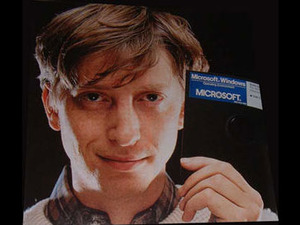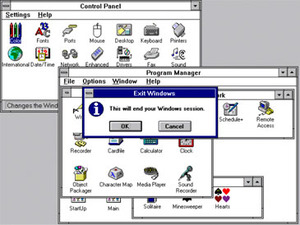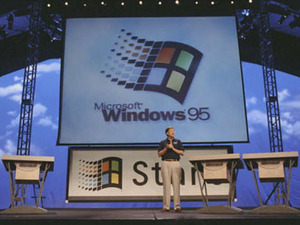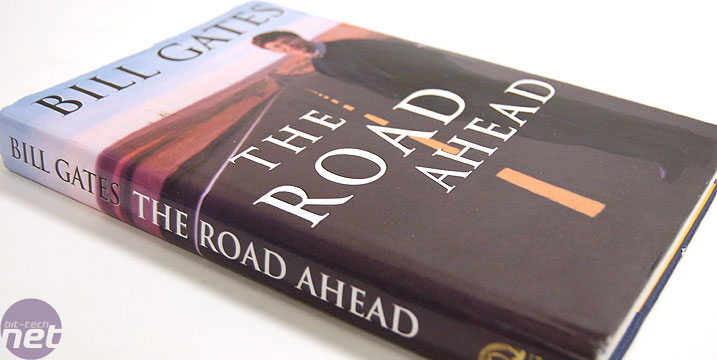

Love him or loathe him, there's no denying the achievements of William Henry Gates III. You may not agree with Microsoft's business practices but it's questionable that you would be sat here reading this today without the vision and sheer determination of one bespeckled über-geek from Seattle.
Gates transformed himself from Harvard drop-out to World's Richest Man within two short decades, witnessing the death of the traditional mainframe and minicomputers and the birth of the Personal Computer (PC).
A brief history of a visionary
Identifying the enormous potential of this new era of computing, best summed up by famously aiming to put "a computer on every desk and in every home," Gates landed the deal to provide the operating system to the very first IBM-PC. Keen followers of IT history will recall that Microsoft didn't even write PC-DOS 1.0 itself - it bought QDOS from Seattle Computer Products for just US$50,000 and simply repackaged the OS for resale to IBM.In a stroke of genius, the deal Gates struck with IBM allowed him to license DOS to other manufacturers - hardly an issue in 1981 as IBM had created an entirely new market with their PC. Big mistake. Less than a year later, Microsoft released MS-DOS v1.25 - the first version for non-IBM hardware, hardware which was appearing rather quickly.


(left) A young Bill Gates holding Windows on a 5.25-inch floppy disk. (right) remember Windows 3.1?
By striking deals with manufacturers to pre-install Windows on the hard drives of new computers, Gates ensured that Microsoft operating systems became the default choice of the vast majority of, well, everyone, everywhere. Having stitched up that area, Microsoft then cranked out version after version of Word and Excel (and later, Microsoft Office) long before EA figured out they could flog you the same sports games year after year just by changing the last digit of the title.
1995
Fast forward to 1995. Austria, Finland and Sweden enter the European Union. Britain's oldest investment company, Barings Bank, collapses after Nick Leeson misplaces US$1.4 billion on the Tokyo Stock Exchange. And at 9:02am on Wednesday 19th April, a rented truck containing some 2,300KG of explosive, kills 168 people including 19 children, in Oklahoma City.

Windows 95 brought us the Start button, and the Blue Screen of Death
Microsoft celebrates its 20th birthday and come August, replaces the aging combination of MS-DOS and Windows 3.11 with the bells & whistles of Windows 95, triggering mass upgrades worldwide and prompting the adoption of an all-new, whizz bang version of Microsoft Office.
Gates turns 40 and, clearly feeling on top of his game, he collaborates with Microsoft's Chief Technology Officer, Nathan Myhrvold, and Peter Rinearson, to write his vision for the future - titled The Road Ahead. The book is pitched as Bill's "bird's-eye view of the undiscovered territory on the information highway - an authoritative, thought-provoking, and very readable travel guide for the journey. In this optimistic and refreshingly realistic book, Gates looks ahead to show how the emerging technologies of the digital age will transform all our lives."
It occupies the top slot on the New York Times' bestseller list for more than seven weeks and goes on to sell over 2.5 million copies.
Of course, attempting to predict the future in any aspect of life, let alone a fast-paced industry like IT, is fraught with danger. Sensibly, Gates acknowledges this in his Foreword:
I'm writing this book now as part of my contribution to the debate (about the information highway) and, although it's a tall order, I hope it can serve as a travel guide for the forthcoming journey. I do this with some trepidation. We've all smiled at predictions from the past that look silly today. you can flip through old Popular Science magazines and read about conveniences to come, such as the family helicopter and nuclear power "too cheap to meter." History is full of now ironic examples - the Oxford professor who in 1878 dismissed the electric light as a gimmick; the commissioner of US patents who in 1899 asked that his office be abolished because "everything that can be invented has been invented.
This is meant to be a serious book, although ten years from now it may not appear that way. What I've said that turned out to be right will be considered obvious and what was wrong will be humourous.
Well, William, it is indeed now ten years later. Let's take a stroll down memory lane and see how many changes you correctly predicted and how many were wide of the mark.


MSI MPG Velox 100R Chassis Review
October 14 2021 | 15:04







Want to comment? Please log in.